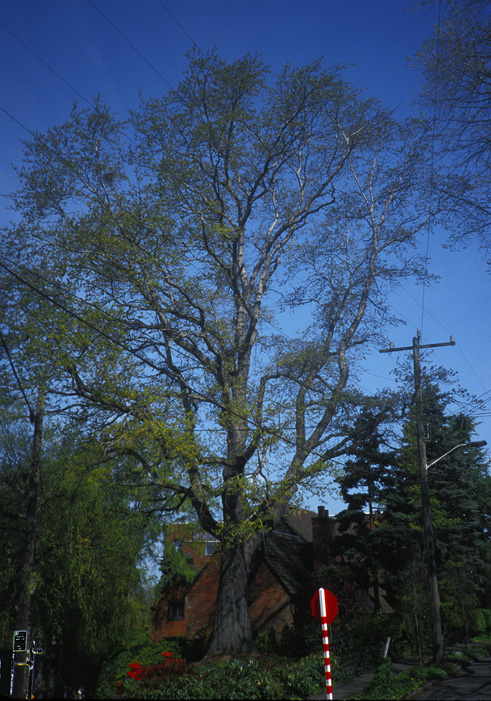
|
Oak Manor
|
| Capitol Hill is Seattle's best tree neighborhood. There is no
disputing that. For diversity and quantity of aged trees, it is easily the top pick.
Its architecture is also outstanding, although I don't begin to know
whether local architects, if polled, would vote it the finest neighborhood in
this respect. Much of the appeal of the Hill is in its stately old shade trees
and mansions. Fred Anhalt, who died this month at age 101, was a
developer who made a dramatic impact because of his distinctive style.
Anhalt's apartment buildings have been termed eclectic Tudor-Gothic, and
other names. To casual observers such as myself, untrained in the
vocabulary of architecture, the buildings are picturesque, romantic, nostalgic,
and --in one word-- comforting. They are rich in soul and perennially popular. |
| At least one Anhalt apartment complex has an extraordinary tree
as well. I refer to the oak of Oak Manor, 730 Belmont Avenue E. Not
only is this oak wonderful as an ornamental shade tree, it is
furthermore Capitol Hill's only old native oak. Seattle (indeed, all of Washington
and British Columbia) has only one species of oak tree. It is called Garry
Oak or Oregon White Oak, Quercus Garryana, its 1839 name
honoring Nicholas Garry (1781 - 1856), an officer of the Hudson's Bay
Company. To see this oak in abundance, visit Victoria or the Fort Lewis area.
In Seattle its occurrence is spotty, most being in the Seward Park vicinity. |
| Anhalt built Oak Manor in 1928, at which time, he said in 1982,
"the tree was about one-half of the size that it is now. How old it would
have been then I cannot tell you. The tree has doubled its size in width and
also in height since 1928. It has been protected with a fence around it and
with no other plants under it. It has received the same care as any other
plants and trees planted at that time." |
| Go look at the building and its protected oak. Be glad that builders
did and do exist who value trees and heartwarming architecture.
Most developers need more respect for greenery and pleasing architecture. |
Regarding our native oak as a landscape tree, it is certainly striking
and eventually awe-inspiring. Its foliage is remarkably intense dark
green, contrasting strongly with the very pale gray, deeply chunky bark. If
it boasted electrifying fall color like many other oaks, it would be
more widely planted. Specimens such as Oak Manor's are in their prime.
Their gawky and slow-growing infancy is an ancient memory; their
serious senescence and dropping of huge limbs yet to come. Right now it is
grand, inspiring, and confers refreshing shade. Wherever people are faced
with an opportunity to plant one tree that can grow enormous, or several
small ones, why do most of us choose several? This species of oak is capable
of growing more than 130 feet wide.
|
(originally published in The Seattle Weekly, July 1996)
Back |
|
|

